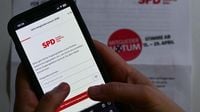In a pivotal moment for Germany's political landscape, the Social Democratic Party (SPD) is facing a crucial decision regarding its coalition agreement with the Christian Democratic Union (CDU) and the Christian Social Union (CSU). This decision mirrors the situation from spring 2018, yet the dynamics have shifted significantly. In 2018, the SPD's voting process resembled a postal ballot, utilizing paper ballots and local counting. However, in 2025, the SPD has opted for a digital voting system, wherein members receive a unique access code by mail to cast their votes online. This digital shift has raised eyebrows and concerns about accessibility and transparency.
The results of this vote are set to be revealed on Wednesday, May 1, 2025, at 10:30 AM, following a 15-day voting period that concluded at 11:59 PM on April 29, 2025. A total of 358,000 SPD members were eligible to participate, and the party required a minimum turnout of 20 percent for the vote to be valid. This threshold was reportedly met by April 28, 2025.
While the SPD leadership is hopeful for a positive outcome, significant dissent exists within the party, particularly from its youth wing, the Jusos. The Jusos have voiced their opposition to the coalition agreement, primarily due to concerns over proposed changes in migration and social policy. They argue that the agreement compromises core social democratic values. "We want a coalition, but not like this," said a Juso member, highlighting the internal conflict.
Carsten Träger, an SPD member and representative from Fürth, acknowledged the challenges posed by the digital voting method, stating, "The SPD membership reflects the entire spectrum of society, and a purely digital vote presents certain challenges." To address these issues, local party branches have organized voting stations equipped with tablets and computers, as well as home visits for those lacking internet access.
Concerns about the security and transparency of the digital voting process have also been raised. Dominik Herrmann, a privacy and security expert at the University of Bamberg, pointed out several weaknesses in the SPD's voting system. He emphasized that the complexity of the cryptographic and organizational processes makes it difficult for members to verify that their votes are counted accurately. “It requires a significant amount of trust in the system provider and its technology,” Herrmann noted.
Moreover, the SPD's website has come under scrutiny for its handling of security claims. Herrmann criticized the assertion that the voting process is secured by requiring both an access code and a membership number, arguing that the latter is not a confidential authentication factor. This raises questions about the party's understanding of the technical processes involved in the voting.
In the broader context of German politics, the SPD's decision will have significant implications. If the coalition agreement is approved, the SPD plans to sign the 144-page document on Monday, May 5, 2025. The CDU's Friedrich Merz is expected to be elected as Federal Chancellor the following day. The SPD has managed to incorporate several key campaign promises into the agreement, including a minimum wage of 15 euros and tax cuts for low and middle-income earners. However, the proposed tightening of migration and social policies has sparked controversy.
The Jusos have been vocal in their opposition, demanding renegotiations on specific points. Despite their pushback, many within the SPD believe that a majority approval is likely, given the absence of viable alternatives. The only other options would be a coalition with the far-right Alternative for Germany (AfD), a minority government, or new elections.
In previous coalition votes, the SPD has seen significant participation rates. In 2018, 78.4 percent of members participated, with 66 percent voting in favor. In 2013, the approval rate was even higher at 76 percent. However, the current political climate is different, with many members expressing skepticism about the coalition's direction.
As the SPD leadership campaigns for approval, they face criticism for their handling of the party's internal dissent. Sigrid Veih, a long-time SPD member, expressed her support for the coalition but warned that any collaboration with the AfD would be unacceptable. “If the CDU aligns with the AfD in any context, the SPD must withdraw from this coalition, or I will leave the SPD after nearly 60 years,” she stated. This sentiment reflects a broader concern among members about the party's identity and values.
As the clock ticks down to the vote's conclusion, the SPD stands at a crossroads. The outcome will not only determine the party's immediate political future but also shape its identity and direction in the years to come. The stakes are high, and the pressure is palpable as members await the results of a vote that could redefine the coalition landscape in Germany.






